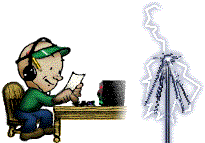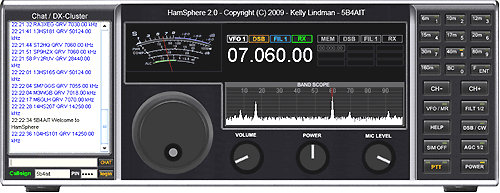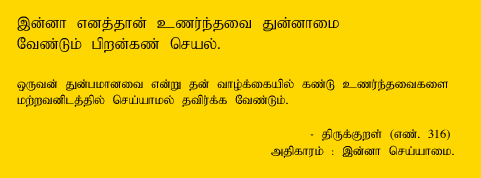

The Amateur bands are not necessarily in competition with the internet but more or less complementing each other in as much as the internet has amateur radio gateways where you can (if you're a licenced radio amateur) use the internet to gain access to certain ham frequencies.
Internet makes it possible for us to contact other hams online and get a QSL card from the operators they work. Some hams have websites in their individual capacity. Some run Websites on behalf of their ham clubs.
Among the ham-related sites that I have come across are sites that spot stations that are currently on air and give the frequencies in which they are transmitting.
Some Websites give QSL info of Amateur Radio operators - including email addresses.
There are many bulletin Websites which list upcoming operations - including those to rare locations.
I often communicate with hams whom I have met over the air, via email. Why not have the best of both worlds? I do and I love it.

|

|
 by
G4NJH
by
G4NJH
Internet is not Amateur Radio: Amateur radio can stand proud on its own two feet, with a history of innovation, invention and research. In that respect it can still stand alone. S, before the indignation starts, please let me state quite clearly that first and foremost I am a radio amateur and proud of it.
Computers made their way into the shack some years ago, in the 80s with logging programmes, distance calculations, satellite apogee / orbits etc., QSL printing and as a general labour saver. Then came the decoders for RTTY, AMTOR, replacing the old more mechanical teleprinters. But the real use for Amateur Radio was probably the rise of Packet Radio.
Packet radio alone as a subject still divides the amateur community. You hear the objection that it is not "in real time", it's "anti-social" and so on. They also say it's not "real" radio. Yet I get more feedback about packet that almost any other mode and it is hugely popular as well as useful. But, you can still hear the debate even now on your local repeater.
Meanwhile the Internet, at first the province of university specialists, took off and became accessible fairly cheaply. Its email systems were much quicker than packet radio; it was a medium which was not going to go away. Clearly it was, in a real sense, a "medium" more special than a newspaper or magazine, more powerful because it was worldwide and able to be accessed potentially by an almost infinite audience. Some said it would fade away. Already opinion was crystalising into the enthusiasts and the Internet-haters. Alas, the latter category were usually the ones who had no conception of what it was. This is still often the case.
There can be no doubt that with the obstacle of exams, the need for specialist equipment and a licence, competing interests and the ubiquitous "choice," which everyone now seems to think they need to fill their leisure hours, combined too with the fact that radio is no longer the magical thing it was in this age of satellite TV, Amateur Radio has been losing ground. In other words, however good it might be, it needs to beat its drum and make itself noticed in competing market. We cannot afford to allow ourselves to become a sort of historic minority interest or a group which never attracts more members.
So back to Internet: the new medium to advance the cause: something to make us rethink where we stand-a new means of communication: an international forum. An exciting new thing to grapple with. If it were just a question of "talking to the computer" rather than communicating with our fellow hams it would not be of a deal of value.
So how did we use this opportunity? For the Radio Societies the response was perhaps understandably slow. Many amateurs took it upon themselves to produce home pages and spread the good news themselves. I believe this has done and can do nothing but good. On this site alone you will find at least 250 links to radio amateur interest sites. This is how it should be. It's a marvellous resource for us all. It is important that page interact too - you should be able to read these pages and then hop on to other resources for other related matters. Nothing could be simpler with this medium.
Finally there are the "radio substitute" programmes - Iphone and the like - where you can effectively substitute radio and speak to others real time, with video add-ons, where 3rd-party rules do not apply and you can say and do what you like. To be able to transfer files, use the white-board, video and chat, voice and everything else is a considerable advantage over an ordinary QSO isn't it? This is where blood begins to boil, particularly amongst those who have had nothing to do with Internet.
Well, yes it is, but you have to realise too that in doing so your personal skills are minimal; your knowledge of the medium is almost unnecessary; you need not get to grips with antennas, propagation, how radio works. If that's what you want, fine. Not everyone wants to work for a skill or a qualification. Is there anything wrong with the easy way? I maintain Internet can only serve as a substitute for the real thing.
At present the sunspot cycle
is giving us difficult and poor radio conditions, so the "timing" of Internet coming to its peak of popularity could hardly be better times. It is communication though, and a very pleasant companion system to our own. Many hams have said they have been speaking to more fellow amateurs since Internet came along, than ever on the air!
So the two systems certainly have a lot in common. Having said that, in radio as we know it, much has to change. We meet, if not to match, at least two re-think what we can achieve with radio: better transceivers are not enough. We need to go further into perhaps digital-type transmissions: this and the idea of even duplex or multi-channel transmission could be over the horizon. We should not rule anything out or fail to believe what could be with enough ingenuity. How far are we prepared to go? Our outdated legislation, here in the U.K., which is full of silly prohibitions (any 3rd party traffic, even saying "hello" to an unlicensed bystander in a QSO is technically illegal here) needs radical revision and the needs to the a lot of creative and lateral thinking. Why should phone-patch not be allowed or the sort of Internet-Radio link, so common in the States not be possible here? Is it a fear by the Authorities of losing control?. We need to harness the undoubted expertise we have in our amateur ranks and the industry which supplies it - which, let us not forget, is largely driven by demand rather than innovation alone.
New Ways - Internet Linking:
Since the above Internet Linking has come about. This allows linking (under a notice of variation of the licence) to repeaters. These in turn can connect to other nodes and provide someone using, say, a small hand held radio on 70cms with the possibility of speaking to a colleague in Sydney, Australia or Peru. The carrier is the Internet but usually there is an RF link at both ends to complete the circuit.
Link to through the internet now? There is a great deal to be written and said about this. G3ZHI has done much work in Sheffield to bring this about and has an extensive web site at http://www.qsl.net/g3zhi/ so I leave you read his pages and follow all his interesting links.
See the Internet Linking Pages at http://www.irlp.net. In VK and in the USA and Canada, IRLP is the dominant Internet linking system, with some 210+ nodes, including Antarctica (hailed as the world's coolest node - literally!). Thanks to VK3JED for that info. His pages are at http://www.qsl.net/vk3jed .

IRLP
- Click on the slide frames to proceed through the presentation. Loading time may be from 30 seconds to 1 minutes depending on the speed of your computer and internet connection.
EchoLink
- Zip File - Downloading time may be from 1 minutes to 2 minutes depending on the speed of your computer and internet connection.



|
Go Top | Go Home |